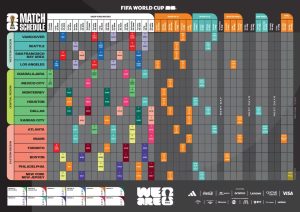

- Western region
- 1 Los Angeles
- 2 SF Bay Area
- 3 Seattle
- 4 Vancouver
- Central region
- 5 Dallas
- 6 Guadalajara
- 7 Houston
- 8 Kansas City
- 9 Mexico City
- 10 Monterrey
- Eastern region
- 11 Atlanta
- 12 Boston
- 13 Miami
- 14 NY/NJ
- 15 Philadelphia
- 16 Toronto
During the bidding process, 41 cities with 42 existing, fully functional venues with regular tenants (except Montreal) and two venues under construction (Las Vegas and Los Angeles) submitted to be part of the bid (three venues in three cities in Mexico; six venues in six cities in Canada; 35 venues in 32 cities in the United States).A first-round elimination cut nine venues and nine cities. A second-round elimination cut an additional nine venues in six cities, while three venues in three cities (Chicago, Minneapolis, and Vancouver) dropped out due to FIFA’s unwillingness to discuss financial details.After Montreal dropped out in July 2021 due to lack of provincial funding and support to renovate Olympic Stadium,Vancouver rejoined the bid as a candidate city in April 2022,bringing the total number to 24 venues, each in its own city or metropolitan area.
On June 16, 2022, the sixteen host cities (two in Canada, three in Mexico, eleven in the United States) were announced by FIFA: Atlanta, Boston, Dallas, Guadalajara, Houston, Kansas City, Los Angeles, Mexico City, Miami, Monterrey, New York/New Jersey, Philadelphia, San Francisco Bay Area, Seattle, Toronto, and Vancouver.Eight of the sixteen chosen stadiums have permanent artificial turf surfaces that are planned to be replaced with grass under the direction of FIFA and a University of Tennessee–Michigan State University research team. Four venues (Atlanta, Dallas, Houston, and Vancouver) are indoor stadiums that use retractable roof systems, all equipped with climate control while a fifth, Los Angeles, is open-air but has a translucent roof and no climate control.The host of the final match—MetLife Stadium in East Rutherford, New Jersey—was announced by FIFA on February 4, 2024.
Although there are soccer-specific stadiums in Canada and the United States, the largest dedicated soccer-specific stadium in the U.S., Geodis Park in Nashville, Tennessee, seats 30,000, which falls short of FIFA’s minimum of 40,000 (Toronto’s BMO Field is being expanded from 30,000 to 45,500 for this tournament).Stadiums including Mercedes-Benz Stadium in Atlanta, Gillette Stadium in Foxborough, Massachusetts, and Lumen Field in Seattle are used by National Football League (NFL) and Major League Soccer (MLS) teams.[47] Although primarily used for gridiron football, with the American stadiums hosting NFL teams and Canada’s hosting the Canadian Football League (CFL), all of the Canadian and American stadiums have been used on numerous occasions for soccer and are also designed to host that sport.
Mexico City is the only capital of the three host nations chosen as a venue site, with Ottawa and Washington, D.C., joining Bonn (West Germany, 1974) and Tokyo (Japan, 2002) as the only capital cities not selected to host World Cup matches. Washington was a host city candidate, but due to the poor state of FedExField, it combined its bid with nearby Baltimore‘s, which was unsuccessful. Other cities eliminated from the final hosting list were Cincinnati, Denver, Nashville, Orlando, and Edmonton. Ottawa’s candidate venue, TD Place Stadium, was eliminated early on due to insufficient capacity.None of the stadiums used in the 1994 FIFA World Cup will be used in this tournament, and Estadio Azteca is the only stadium in this tournament that was used in the 1970 and 1986 FIFA World Cups.
Due to FIFA’s rules on stadium sponsorships, the venues will use alternative names for the duration of the tournament,given here in parentheses.
- A † denotes a stadium used for previous men’s World Cup tournaments.
- A ‡ denotes an indoor stadium with a fixed or retractable roof with interior climate control.


